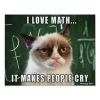-
Posts
184 -
Joined
-
Last visited
Reputation Activity
-
 TenaciousBushLeaper reacted to Gepetto13 in Quantitative Psychology PhD
TenaciousBushLeaper reacted to Gepetto13 in Quantitative Psychology PhD
So then when writing a personal statement for a quant program, one should focus on researching statistical topics? Or would it be good enough to state that experience at work has lead one to become fascinated with methodology and statistical methods for psychology research? And to want to learn those methods and, perhaps, improve upon them?
-
 TenaciousBushLeaper reacted to spunky in On 2% Acceptance Rates - Is the (Social)Psychology PhD a Crapshoot?
TenaciousBushLeaper reacted to spunky in On 2% Acceptance Rates - Is the (Social)Psychology PhD a Crapshoot?
what....what is this strange feeling?
COMPETITION?
-
 TenaciousBushLeaper reacted to spunky in Quantitative Psychology PhD
TenaciousBushLeaper reacted to spunky in Quantitative Psychology PhD
Well… uhm… to be honest, if you’re starting from “below ground zero” and don’t have an advisor to guide you through the process, I’m not sure how doable Option 1 would be for you (where Option 1 means working out some theoretical result). Usually, it does take some exposure to theoretical psychometrics or statistics to become acquainted with these types of problems and see how to go about solving them. From my experience, if something seems straightforward enough either people won’t care about it (because it’s too simple) or it’s not relevant enough. But here are some of the things in which I have (unsuccessfully) dabbled in, in case you want to take a shot at them:
- Tenko Raykov has been the only person I know who was able to derive the exact bias of Cronbach alpha, in the population, when the data follows a congeneric 1-factor model (different loadings, different error variances). He leaves open the problem of deriving the bias for finite samples. You could try and work on it.
- Ke-Hai Yuan (et.al.) derived a new definition, standard error and sampling distribution of Mardia’s multivariate kurtosis under data that is Missing Completely At Random (MCAR).There has been work (and I'm currently looking into it) to extend it to the more general case of Missing At Random (MAR) but the standard errors/sampling distribution has been much more difficult to derive than anticipated. You could try a shot at that.
- Donald Zimmerman extended the axioms of Classical Test Theory to measure-theoretic Hilbert spaces. In order to accommodate for more flexible types of norming not restricted by the inner-products, my advisor and I have attempted to extend them to Banach spaces. We haven’t been able to… but you’re welcome to try
If you want my opinion, I think Option 2 (a Monte Carlo simulation study) seems like a much more doable option if you’re mostly working on your own. You just need to become sufficiently proficient in statistics and R (or any other software but I’m R-biased LOL) and figure out how to program the right things there. There is A LOT of simulation work going on all the time and I feel like this is a problem that you could tackle.
Option 3 I am conflicted about. In general, I don’t feel like Quant Psych peepz really see analyzing data with a fancy method like anything particularly worthwhile (unless it’s a devilish design or something) because it really only says “oh look! I know how to type the right commands of code!”. A twist that I would give it to make it more interesting is maybe looking for similar problems in finance or economics or physics and bringing in those methods into Psychology. For example, in the Journal of Behavioural Statistics someone suggested the use of a method apparently used in by particle physicists to analyze likert-type data and settle, once and for all, the debate on whether you should analyze this type of data with parametric or non-parametric methods. Big Data and Machine Learning algorithms are really hot right now so you could maybe try and data-mine some big Mental Health database or something… I could see people being interested in that.
But in terms of what would get you published in a quant journal at this stage, I suggest Option 2. Although if you manage to solve any of the problems in Option 1 do let me know
I really hope someone else who is in Quant Psych would chip in here. I feel like the people who read this thread are only getting my perspective of things and I’m sure people would benefit more if more perspectives were brought into the discussion.
-
 TenaciousBushLeaper reacted to spunky in Quantitative Psychology PhD
TenaciousBushLeaper reacted to spunky in Quantitative Psychology PhD
That's entirely possible. The majority of people who apply to Quant Psych programs are psych undergrads who took both the intro and advanced research methods sequence and somehow (usually accidentally) end up finding about this area of psychology. I think it is desirable (but not mandatory) to have a solid foundation in math/stats beyond the intro and advanced research methods courses with the benefit of hindsight, comparing my experience with that of my peers who didn't have a solid math base. But I find it difficult to believe that any program would just outright reject someone because he or she didn't go through the college calculus sequence or something like that.
Just be willing to work hard, have tons of fun and you'll be OK
-
 TenaciousBushLeaper reacted to juilletmercredi in Quantitative Psychology PhD
TenaciousBushLeaper reacted to juilletmercredi in Quantitative Psychology PhD
I just want to co-sign on everything @spunky said (I love @spunky's enthusiasm for quantitative psychology, lol!). I did my PhD in social psychology but I am currently in a quantitative psychologist postdoctoral program. There are excellent job opportunities, both academic and non-academic, for quantitative psychologists. There are more academic positions than there are graduates, but there are also tons of private and government agencies that desperately need people who know how to do statistics but also know how to interpret them into useful social science information for the masses. That's where you come in!
I also want to add that it's quite common for programs to have a quantitative minor - so you could get a PhD in cognitive psychology and minor in quantitative psychology. One example of such a place is UCLA (or you could do the opposite - major in quant, minor in cog psych). Every quant psych program encourages people to develop a substantive interest as well, so you could go to a quant psych program and study primarily cog or cog neuro problems if you wanted to! Still other programs without formal quant programs will allow you to earn a concurrent master's in applied statistics (like Penn State or Yale) or have flexible enough requirements that you could take substantial coursework in statistics and potentially earn a master's in statistics if you wanted to (like Columbia, my own program. My former advisor there is an excellent methodologist, btw. NYU also has a quant minor with a methodologist I know from grad school - great guy).
*raises hand* that's me. I am much more of a psychologist with a keen insight and intuition for advanced statistical methods than I am a mathematician who has an interest in psychology. That's partially a result of my training - I went to a social psych program and not a quant psych program, because I didn't know quant psych existed in undergrad - but partially a result of my interests, too. I've noticed this at my postdoctoral fellowship, which is in a research center focused on methodology and statistics that employs a bunch of quantitative psychologists, statisticians, computer scientists, and social/developmental psychologists (and an epidemiologist). There are some of us who are driven to develop statistical models because of an abiding interest in the theoretical statistics itself, and they need substantive scholars to bring applied problems to them that they can use to test the statistical methods they develop. There are others of us (including myself) who have substantive questions that we want to answer, and so we work on teams to develop the methods because we need a method to answer the questions in which we're interested. Of course, it's not so black and white - I do have some theoretical interests in statistics and methods (and I love equations and Greek letters, lol) and some of the more mathematical folks do have substantive interests in certain fields; everyone at our center does drug abuse research, for example, because it's funded by NIDA.
You can take either path, but it's more lucrative to take the path in which you have more theoretical knowledge and are a statistician with a keen interest in psychology who can develop methods. It's because there are fewer of you, and there are more opportunities to do data science in the non-academic world. But...you should also follow your interests!
-
 TenaciousBushLeaper got a reaction from spunky in Low quant GRE: successes and failures
TenaciousBushLeaper got a reaction from spunky in Low quant GRE: successes and failures
I really hate to be the one to say this but I honestly doubt that anyone who dedicates 2-3 hours each day, for say a 3 month period to studying and prepping for the quantitative section of the GRE will get anything below 70%. Unless of course you truly do have a learning deficiency in mathematics, in which case I have no idea what would be needed to improve your score.
-
 TenaciousBushLeaper reacted to spunky in If you could design an introductory stats course....
TenaciousBushLeaper reacted to spunky in If you could design an introductory stats course....
I’ve both TAed and taught undergraduate statistics/methods courses (and a couple of graduate-level courses) and have tried to experiment with every possible method (even early-childhood education ones) to convey the material in the most efficient way. There are two things that, for better or worse, I have concluded: (a) there has to be an exam component to it and (b ) the exam component has to carry enough weight on the student’s grades that will motivate them to study and review the material.
When I started my MA and began taking the same courses as everybody else I was 100% against exams and complained to the instructor (in a friendly manner, of course) about this. My reasoning was that if you had made it this far in your education, you were willing to study and learn the material because you knew it was important. What the prof said was that you always had to assume students will try to get away with doing as little as possible in classes like this because they tend to not like the material. Fast-forward a few years when I started teaching and I did start finding out that students had a harder time mastering the actual concepts behind statistics if they felt they were not going to be tested. It was like they did not need to put on the effort as much to struggle with the concepts and learn the material… and that is an extremely critical thing that needs to happen if you are seeing this stuff for the first time.
When I attempted assignment-only courses, my students became incredibly skilled SPSS-button-pushers and that’s about it. Then they would show up at my door a few months down the line when they had to work on their theses/dissertations/manuscripts and I would get very frustrated because they couldn’t even work out the simplest things by themselves. Like I would tell them “we saw this in class, is in your notes, it’s in X or Y chapter of the book”. One of my students actually gave me a very good hint as for why they were unable to apply this stuff: he said that he always worked in a group with other two people or compared his answers with other students to make sure everything was right before handing it in. So the end result was a class where everybody got an A but only 3 or 4 people knew how things worked.
Ever since then I decided exams are the only way I had to ensure that people are actually going to try things at home, practice them, struggle with them and, one way or another, learn them. I have changed the focus into making the classes more interactive though… like I use R to code interactive animations of regression or ANOVA (because the entire linear model has a geometric analogue so you can actually show it in pictures), we have class discussions, we have group activities, etc… but I always keep an exam component in my courses now…lurking…waiting.
I wholeheartedly agree with this. The prof who taught me linear algebra had this famous (paraphrased) quote saying: "every self-respecting mathematician should, at some point in his or her life, have to find the inverse of a non-trivial matrix BY HAND". And if you have ever had to found the inverse of a matrix by hand then you know the process is both terribly boring and incredibly illuminating. As someone who both teaches and consults statistics I feel the greatest problem that we face is not so much in how we evaluate the material but how we deliver it. I feel a lot of people in Psych and other social scientists can become really good at following “ready-made” numerical recipes and feed them into SPSS but when it comes to actually understanding where these numerical recipes come from and, more importantly, how to adapt them to new types of data or designs well… then all hell breaks loose.
-
 TenaciousBushLeaper reacted to suzieq in If you could design an introductory stats course....
TenaciousBushLeaper reacted to suzieq in If you could design an introductory stats course....
I also like this idea, because knowing what analysis to run requires a lot of knowledge.
Another thinking point: Many of the students in an intro course will likely NOT really need in-depth stats in their careers. For many, it will be good if they understand percentages and correlations, and a lot of them know that. It can be motivating to use quirky or creative examples that illustrate stats concepts without getting too much into theory. I know that sounds disappointing for those that really care about research, but in an intro class it's important to remember that most of these people won't end up as researchers, and those that will might not even have that career path on their radar yet.
-
 TenaciousBushLeaper got a reaction from L83Ste in If you could design an introductory stats course....
TenaciousBushLeaper got a reaction from L83Ste in If you could design an introductory stats course....
If I could design an intro stats course, I wouldn't have any exams. All assignments would be more like short 1-2 page papers where students would have to work through problems to show their knowledge of the material. Students could re-do these assignments for better grades, provided they've made a significant improvement on the assignment. In a perfect world, students would discuss concepts in class (the professor/ta would lead the lecture/discussion but students would need to have mandatory discussion questions) & then during lab students would apply the concepts from the lectures.
Maybe a mock up assignment would be, given a data set students would need to analyze the data based on a target goal set by the instructor. On top of accurately applying the concepts, students would need to justify the type of analysis. Why they choose analysis x over analysis y, what information does it provide, what are the drawbacks.
-
 TenaciousBushLeaper reacted to EastCoasting in Low quant GRE: successes and failures
TenaciousBushLeaper reacted to EastCoasting in Low quant GRE: successes and failures
You are being compared to other psychology students--those who are applying to the same programs as you. Maybe most of psychology majors score terrible, but they are not the ones being considered for funded grad school slots, because there are enough applicants with good scores. I studied for months and took a course. English is my second language, I was 29 and pregnant with my second child, and I too had to relearn all the math stuff that I hadn't thought about in years. At the end of the day, it's about remembering the information--both verbal and quant--until it is reflexive, and you need to be able to analyze what is in front for you in order to be able to utilize that information correctly. I agree that higher level stats classes should trump quant grades, but I also think this test can demonstrate the ability to work hard and think quick. I took at least 9 practice tests, and went through countless questions. The hard work paid off and I scored in the 90th+ percentiles.
-
 TenaciousBushLeaper reacted to spunky in Low quant GRE: successes and failures
TenaciousBushLeaper reacted to spunky in Low quant GRE: successes and failures
the GRE is really only "a thing" in North America... and i would go as far as say it's mostly "a thing" in the U.S. because even some Canadian universities (like McGill) have peculiar policies where you don't have to submit your GRE scores depending on where you studied. NEVERTHELESS i kind of have to agree on this one. if you want to do graduate school in English or in a North American setting you just have to suck it up and jump through the hoops like everybody else. yes, we do have to do twice the work (i was born in Mexico so i know what i'm talking about here), yes we have to study twice as hard and yes, we need to struggle twice as much. but that is life and it can be done if you're willing to make the sacrifice. -
 TenaciousBushLeaper reacted to TenaciousBushLeaper in Low quant GRE: successes and failures
TenaciousBushLeaper reacted to TenaciousBushLeaper in Low quant GRE: successes and failures
I really hate to be the one to say this but I honestly doubt that anyone who dedicates 2-3 hours each day, for say a 3 month period to studying and prepping for the quantitative section of the GRE will get anything below 70%. Unless of course you truly do have a learning deficiency in mathematics, in which case I have no idea what would be needed to improve your score.
-
 TenaciousBushLeaper got a reaction from suzieq in Inquiries about other interviews
TenaciousBushLeaper got a reaction from suzieq in Inquiries about other interviews
3 faculty from my university recently had a talk about this in a sort of informal course where graduate students, RA's, lab managers, and faculty speak on topics in academia. One of those topics was (about two weeks ago) on graduate school admissions. All 3 of them had the same reasoning for why they ask students about other programs they've applied to. It really came down to "are you going to come here?", that's what they want to know when they ask you this question, this is a type of gauge, they want to weight the odds of you accepting an offer at their program when their program might have to compete with school X
-
 TenaciousBushLeaper got a reaction from Schizo-Neuro enthusiast in Low quant GRE: successes and failures
TenaciousBushLeaper got a reaction from Schizo-Neuro enthusiast in Low quant GRE: successes and failures
I really hate to be the one to say this but I honestly doubt that anyone who dedicates 2-3 hours each day, for say a 3 month period to studying and prepping for the quantitative section of the GRE will get anything below 70%. Unless of course you truly do have a learning deficiency in mathematics, in which case I have no idea what would be needed to improve your score.
-
 TenaciousBushLeaper got a reaction from kurumi2117 in Low quant GRE: successes and failures
TenaciousBushLeaper got a reaction from kurumi2117 in Low quant GRE: successes and failures
I really hate to be the one to say this but I honestly doubt that anyone who dedicates 2-3 hours each day, for say a 3 month period to studying and prepping for the quantitative section of the GRE will get anything below 70%. Unless of course you truly do have a learning deficiency in mathematics, in which case I have no idea what would be needed to improve your score.
-
 TenaciousBushLeaper reacted to St Andrews Lynx in Venting Thread- Vent about anything.
TenaciousBushLeaper reacted to St Andrews Lynx in Venting Thread- Vent about anything.
Snow.
F*ckin' snow.
Can't they do anything about all the damned snow?!
Signed,
Everybody on the Eastern Seaboard.
-
 TenaciousBushLeaper reacted in was excited initially about my decision.. now a month later deeply regretting it.
TenaciousBushLeaper reacted in was excited initially about my decision.. now a month later deeply regretting it.
could you back out of your choice since you haven't started yet? then reapply again next year and go to the school you wanted .
-
 TenaciousBushLeaper reacted to BlackScreenG in was excited initially about my decision.. now a month later deeply regretting it.
TenaciousBushLeaper reacted to BlackScreenG in was excited initially about my decision.. now a month later deeply regretting it.
If I ask you to choose between an apple, an orange and a pear, guess what: "You get confused :unsure: ". After you have made your choice, , you feel damned. Its all natural. However, if I give you only an orange, you dont get any of those thoughts and terrible feeling and you still get to enjoy the orange :) .
To help yourself, simply assume school A and B rejected you and you just had to choose C. Also ask yourself, if school C was the only option you had , would you have a terrible academic career?
#learn to look on the bright side, no one knows the perfect decision, its just important to keep moving..
-
 TenaciousBushLeaper got a reaction from Angua in Academic placement rate of UChicago Psychology
TenaciousBushLeaper got a reaction from Angua in Academic placement rate of UChicago Psychology
Question, if you'd be an "average" candidate at UChicago, are you saying you wouldn't be an "average" graduate student at a place like Yale, Harvard, Princeton, Stanford, etc? My university turned down people from Harvard and Princeton to hire a faculty member who received his PhD from UMass, and another who received his PhD from the University of Iowa.
What's going to matter most is your productivity and what you contribute to your field. I'd take someone who changed the game at a community college over some who barely added anything to my field at Harvard , any day.
Some of these things may often co-occur, that is to say game changers may come from really prestigious universities but the fact that they do doesn't mean that's the reason why the did so well in their research. What you need to worry about most, first is, making sure you're entering into a program/field where you'll obsess over your work. Then making sure you're going somewhere productive to your productivity. Is the lab funded, do you like the PI, do you like the other grad students. THEN all else being equal you may worry about prestige.
-

-
 TenaciousBushLeaper got a reaction from CogPsych2015 in Favorite books / references for your respective sub-fields
TenaciousBushLeaper got a reaction from CogPsych2015 in Favorite books / references for your respective sub-fields
Hi all,
So I thought I'd make this thread. Essentially I'm asking anyone/everyone who is willing, to post the information (title/edition/authors) of your favorite books/references for your respective fields/topics of study. (This can include your favorite methods/stats books)
I enjoy the fact that psychology is more or less an all encompassing field & I find a lot of other topics within psychology very interesting(of course some more than others). &.....I NEEDS MOAR NOLEDGE lol.
Anyways I guess I'll start:
Statistical Inference by George Casella & Roger L. Berger
Cognitive Neuroscience by Marie T. Banich & Rebecca J. Compton
Awk Programming by Arnold Robbins
Introduction to Psycholinguistics: Understanding Language Science by Matthew J. Traxier
-
 TenaciousBushLeaper reacted to Gepetto13 in 2015 - Social Psych
TenaciousBushLeaper reacted to Gepetto13 in 2015 - Social Psych
There might be something to it, but there's really no way to verify.
But I can tell you (from experience and faculty admitting it) that if you apply to clinical programs, just being male makes you stand out as the vast majority of applicants these days are women. It doesn't give you a huge push as you still need to meet all the other requirements (gpa, gre, good letters, research ideas, etc). So you can't be unqualified and still get in.
-
 TenaciousBushLeaper got a reaction from Schizo-Neuro enthusiast in UC Berkeley
TenaciousBushLeaper got a reaction from Schizo-Neuro enthusiast in UC Berkeley
I like that user name Schizo-Neuro enthusiast








